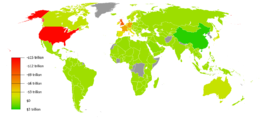
Back ميزان المدفوعات Arabic Balanza de pagos AST Tədiyə balansı Azerbaijani Платежен баланс Bulgarian বিনিময় ভারসাম্য Bengali/Bangla Balança de pagaments Catalan باڵانسی پارەدان CKB Platební bilance Czech Betalingsbalance Danish Zahlungsbilanz German

In international economics, the balance of payments (also known as balance of international payments and abbreviated BOP or BoP) of a country is the difference between all money flowing into the country in a particular period of time (e.g., a quarter or a year) and the outflow of money to the rest of the world. In other words, it is economic transactions between countries during a period of time. These financial transactions are made by individuals, firms and government bodies to compare receipts and payments arising out of trade of goods and services.
The balance of payments consists of two primary components: the current account, and the capital account. The current account reflects a country's net income, while the capital account reflects the net change in ownership of national assets.